On 15 May Palestinians commemorate the Nakba, the anniversary of the 1948 catastrophe—the destruction of hundreds of thousands of Palestinian lives brought about by the creation of the state of Israel. A few nights ago, a Palestinian friend posted on Facebook an Al Jazeera article regarding the Nakba. I started reading it until halfway through I was stopped in my tracks by the cover photo of an embedded video. It was a photograph of a band and I’d be damned if I didn’t recognise the man on the bottom-right corner playing the saxophone! It was a face I’d seen in photos more than once.
I gave up on the article and immediately started watching the video instead. A 50-minute documentary titled Lost Cities of Palestine made in 2011 by Ramez Kazmouz, it described the richness of urban life in Haifa, Jaffa and Nazareth in the 1930s and ‘40s, through interviews with old and some not-so-old Palestinians and lots of archival footage and photos. Fascinating and at the same time depressing as the history of lost homelands tends to be.
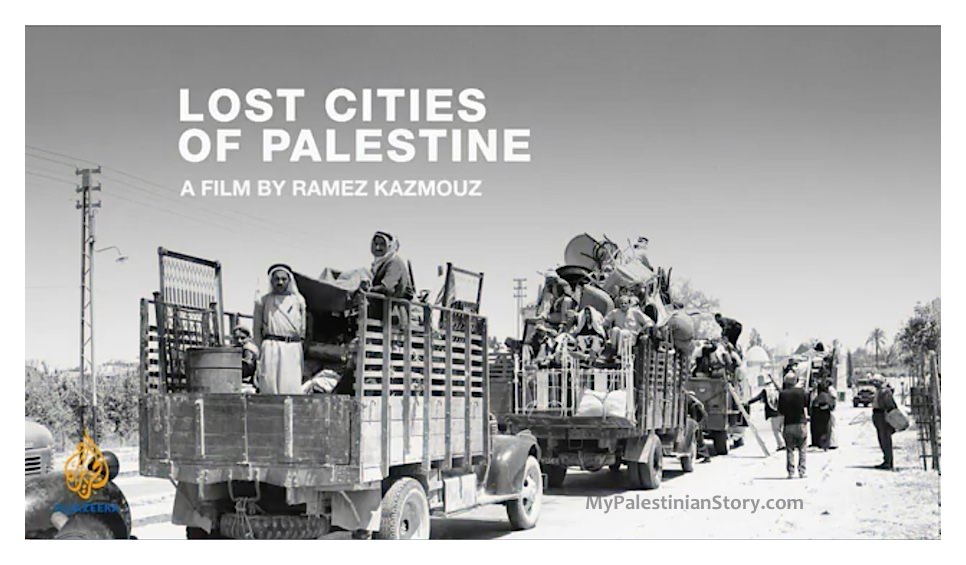
I was so engrossed I almost forgot why I had started watching it. Around 19:25 a new section titled Palestinian Music and Cinema began with a series of photographs. At 19:47, the photograph of the sax player and his band came up again and gave me another jolt: in my initial excitement I had missed another familiar face in the photo, one who is near and dear to my heart: my great-uncle Nicolas (Colia) Schtakleff! There he was, just off centre frame, with his accordion and a big smile on his face, in what was undoubtedly the PK band (PK being the sax player) in which he played with his friend Afif. I couldn’t believe it! It cheered me up no end and I went to bed with a smile on my face to match his.
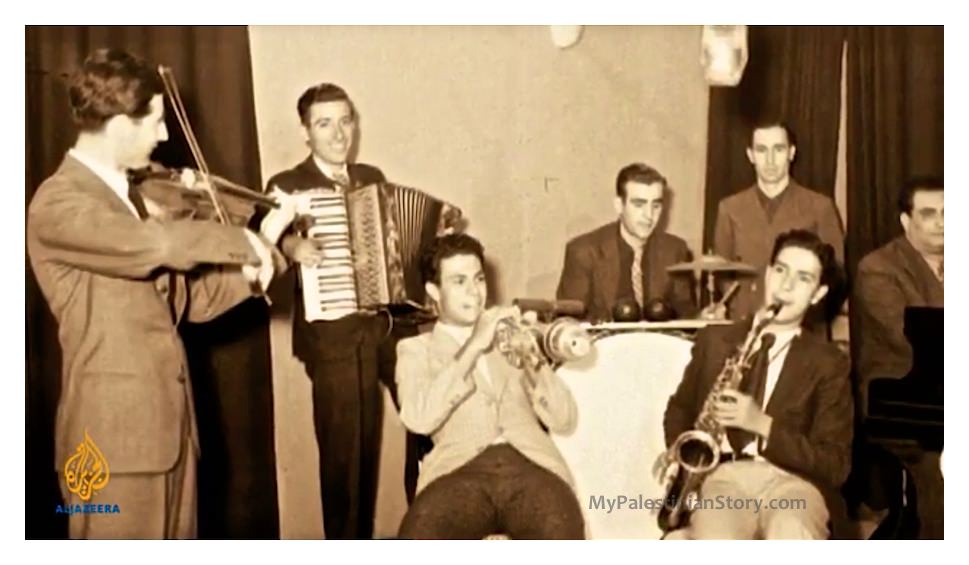
The following day I emailed Al Jazeera asking where the photograph had come from and could I possibly have a copy. A bit of a long shot but as a friend of mine always says: If you don’t ask, the answer is No.
While I wait for a reply (or lack thereof) this is the perfect opportunity to tell the story of Colia and Afif alongside the parallel story of my friendship with Mona which has been marked by a series of serendipitous events. Trust me, it all ties up together in the end!
The way Mona and I met was serendipitous in itself. The daughter of a Jerusalemite mother, Mona has been researching Palestinian history for many years and has been active in Palestinian affairs and charitable work. As part of her research, she has amassed thousands of photographs of Palestinians and their lives which she publishes on her Facebook page, British Mandate Jerusalemites’ Photo Library (BMJ). In short, she was the perfect person to contact when the people behind the Katamon Project (which has evolved into Jerusalem, We Are Here) were looking for old residents of Katamon or their descendants. And that’s exactly how they found me.
In the summer of 2012 they contacted Mona who broadcast their message to her extensive email list which somehow included my aunt Cynthia Schtakleff in New York (even though they did not know each other personally.) Cynthia, knowing I have the family history bug, forwarded the email to me. I wrote to the project to express interest in participating and explained my background: daughter of an old resident of Katamon, family history lover. And out of courtesy I copied Mona. The project took their time to reply but Mona did within the hour thanking me and informing me she lived in Berkeley, ie across the bay from San Francisco which is my base. She suggested enthusiastically that we meet upon my return to the Bay Area (I was in Cyprus at the time) and in short order followed with various photos of my ancestors, the Schtakleffs. The two she sent of Colia just about summed him up as the character and clown that he was.
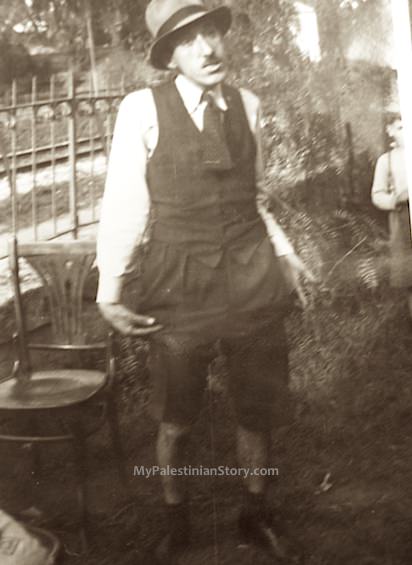
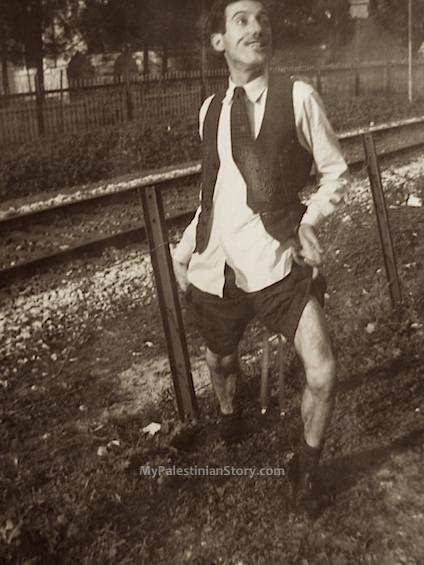
Colia was my favourite uncle although, to be truthful, all my Schtakleff uncles were favourites: characters larger than life, with zest for living, wonderful sense of humour and lots of time for us when we were children (and later as adults). But Colia, with his funny faces and voices, his impersonations, his silly phrases as well as his music was a child’s dream uncle.
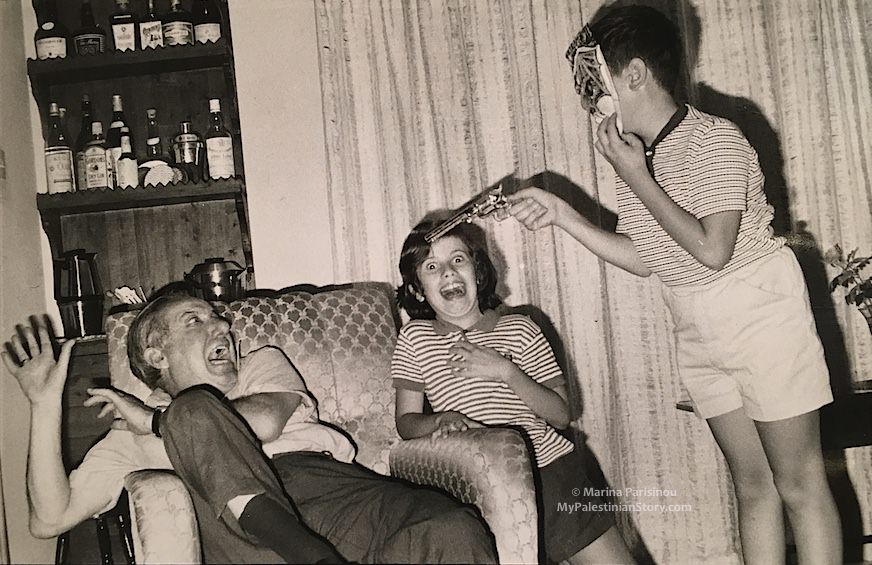
In March 2003 I fulfilled a long-time wish—and promise to him—and travelled to New York, where he then lived, to spend time with him. At nearly 86, he was my grandmother’s last remaining sibling, the only one left of that generation who could tell me the Schtakleff stories. For the week I was there we settled into a daily routine where I’d go downstairs to his flat in the morning (I was staying upstairs with Cynthia), I’d turn on the recorder, ask him a question and off he’d go.
We started with the family tree of which he had an impressive command. He had good relations with most members of the extended Schtakleff clan and had kept in touch with many of them. From there we entered the time machine and I travelled with him to Jerusalem and beyond watching his adventures and expeditions, his attempts to make something of himself, his loves, his disappointments and setbacks. He laughed, he cried, he swore me to secrecy over things he had never confided to anyone before—and he sang.
We’d take a break for lunch and when I wasn’t meeting friends, we’d walk to Astoria together to stretch our legs. He bemoaned the loss of practically all of his friends and relatives of his generation as well as that of his wife, Terry. He was very fond of his nephew and niece—Cynthia and her brother, Alex—but they were busy with their own lives as he understood younger people tended to be. He felt lonely.

One of the many things he talked about was the music bands he played with in Jerusalem. He credits my grandmother, his eldest sister, Vitsa, with luring him into playing music. When as a young boy he contracted pneumonia, Colia went to stay with Yiayia Vitsa (yiayia = grandmother in Greek) and Papou Manolis (papou = grandfather) at Breij, an estate several miles out of Jerusalem that Papou leased from the Greek Orthodox Patriarchate, and where he took his young bride in 1922 when they married. Yiayia, accustomed to the cosmopolitan life of Jerusalem, felt pretty isolated at Breij and finally Papou bought her a piano which kept her company. She was an accomplished musician, having studied the piano for years. She would play all sorts of music, including entire operas, like La Traviata. Colia would listen, his ear got tuned to music and his fingers were eager to try. He started with one finger on a harmonium his parents had at home in Jerusalem and then learnt how to play chords and got an accordion. He never learnt to read music, though: always played by ear.
When Manolis and Vitsa finally returned to Jerusalem (by 1930) Vitsa and Colias often played and sang together. He also got involved with two bands. Occasionally he would join the Greek band of Vassos Mavromichalis but more regularly he’d play with the PK band.
According to Colia, the PK band was the only non-Jewish band in Palestine and they played everywhere: Haifa, Jaffa, Amman etc. It was a dance band with PK on the sax and the clarinet and his brother on the trumpet. Michel Schtakleff, Colia’s second cousin, was the drummer for a while (and is, I believe, the drummer in the Al Jazeera photo above) and Afif, a good friend of Colia’s, played the piano. Like Colia he didn’t read notes, only played chords, but knew so much more than Colia who could only do tangos, waltzes, rumbas and the like while genres like jazz and rock-and-roll eluded him. Colia learnt a lot from Afif and considered him his “manager”.
When one of Colia’s brothers, Coca (Constantine), partnered with a friend to provide catering services to the Greek Club, they asked PK if the band would play there so people could dance. As the budget would not cover the full band, Colia asked Afif if the two of them could take on the gig (although I doubt they called them gigs in those days!) With one of them on the piano and the other on the accordion, the two amigos quite adequately provided dance music at the club on weekends.
Colia was also well known as a comedian who did all sorts of impersonations. On Afif’s suggestion, he created a sketch about the League of Nations: Hitler, Mussolini, King George, Greek and Arab delegates – they were all characters in Colia’s act. People loved it and kept asking for it at parties and gatherings. One evening at the Greek Club, Afif and other friends egged him on so Colia jumped on the stage and did his League of Nations performance. His Churchill impersonation, with the requisite cigar in his mouth, included the line: “I’m proud! We’ve won the war – and the allies did it for England!” Three British policemen whose barracks were close by were sitting at the bar. When Colia came off stage and went up to the bar for a refreshment, one of them asked him if he was the one who made the joke about the English. Colia’s reply in the affirmative earned him an instant punch in the face, right on his eye, causing him to practically lose his sight in that eye for good!
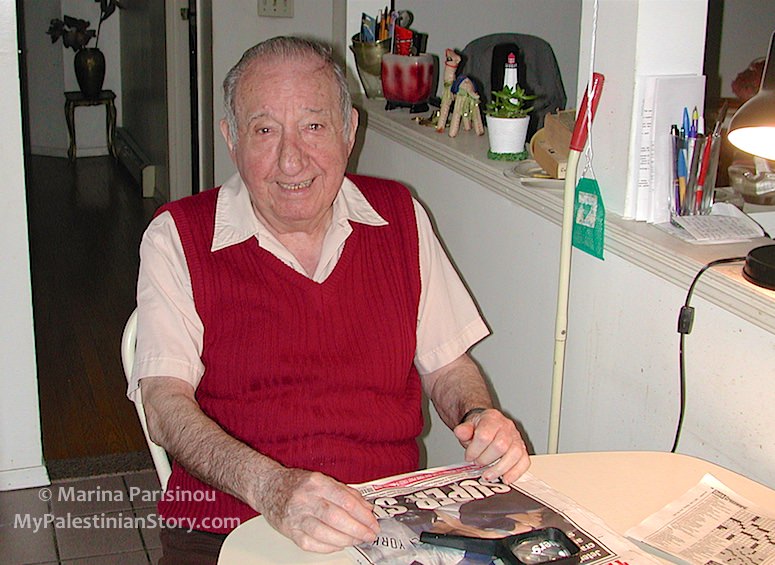
Not all of his stories had a grim ending. Another story was about Afif’s sister, Zakia, who had a good voice and would sometimes sing with the band at the YMCA or in private clubs. The band’s repertoire included a Greek song—in the “oriental style”—called Jamileh. Zakia loved the song and wanted to sing it but… it was all Greek to her! So she asked Colia if he could write French lyrics for it and Colia was happy to oblige. Zakia sang the French version of the song for the first time at the Jerusalem YMCA. Some time later, after performing the song in Jaffa, PK was approached by a young man who seemed intrigued and wanted to know more about the song. PK explained its origin and Colia’s contribution in terms of lyrics and the man was surprised because he had heard the French version of the song in Paris! “Imagine, my song made it to Paris! And I got no royalties for it!” quipped Colias, guffawing with nostalgic delight.
I asked him for the lyrics and he sang a few verses: Jamileh, ton regard m’a suffit… Unfortunately my recording is skipping so I haven’t been able to transcribe them all. Similarly I had been unable to figure out what PK stood for. Until BMJ came to the rescue!
In the summer of 2014 I was in Cyprus once again for the summer and preparing for a trip to Jerusalem. Before leaving San Francisco I had helped Mona create her BMJ page. We had become fast friends and would meet often to exchange family history information, photographs, maps, experiences. She liked the way I had set up a page for my father’s photos and wanted to do something similar with her own treasure trove. So we spent an afternoon setting it up and it’s no exaggeration to say that BMJ became an overnight Facebook sensation. People just loved the gems of her photo library and couldn’t get enough (they still can’t – currently BMJ has over 12K fans.)
A couple of weeks after the umpteenth listening of my recording proved to be just another futile attempt to decipher what PK stood for, the photo of a band appeared on BMJ: The PK band! The *P*ascal *K*amar band! Bingo! I was so pleased to have finally cracked this. But then Mona had added a line in the photo description that read: “My mother often sang to an audience while the band played.” Mona wasn’t mentioning her mother’s name but I knew it: she was called Zakia. Wait a minute! Zakia? Zakia was Afif’s sister! My mind was overwhelmed and just couldn’t process it all. I emailed Mona asking for enlightenment. Her reply arrived the following morning: “Wow, wow, wow! Yes, Marina, Zakia is my mother and Afif is her brother! What a small world! Yes, my mom sang with the PK band sometimes.”
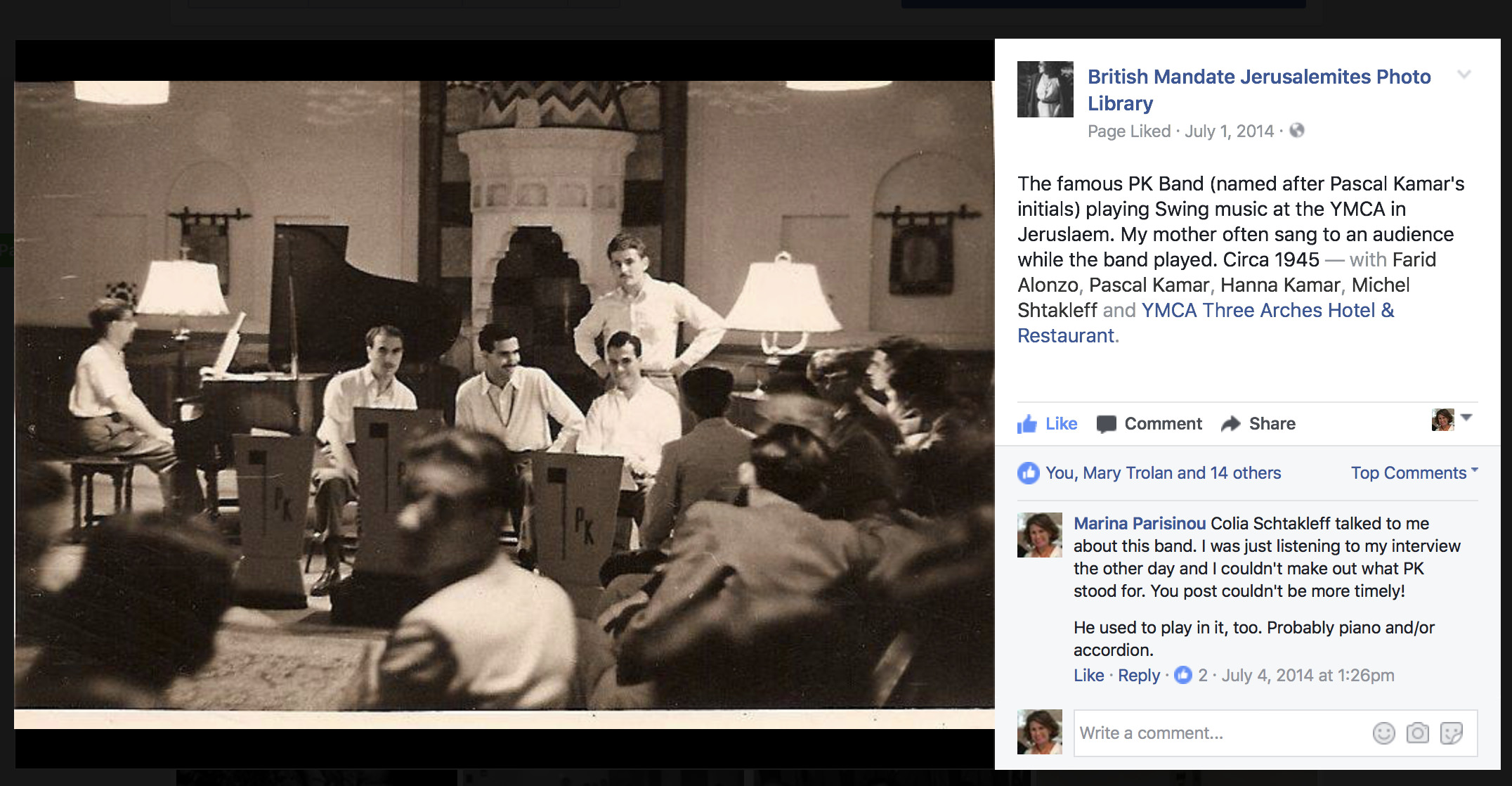
Had Colia, Afif and Zakia been told back then, in their Jerusalem days, that one day, some 65 years later, Colia’s great-niece would become friends with Afif’s niece/Zakia’s daughter in the San Francisco Bay Area, how would they have reacted? Perhaps they would have played It’s a Small World After All—with Colia on the accordion, Afif on the piano and Zakia on vocals! (Even though that song wasn’t written till the early 1960s.)
As for Jamileh, my best guess is that it’s this song written by Manolis Chiotis. It’s the only one I’ve been able to find by that name and dating back to that era that sounds similar to what Colia had sung to me a cappella. Chiotis’s Jamileh was released in 1947 so it just about fits, although a bit tightly given that by early 1948 life in Jerusalem was already unravelling and by May 1948 it was blown to smithereens for Colia and his friends—and for so many others. Either way, it’s a small world—albeit a cruel one at times. ❖
Leave a Reply